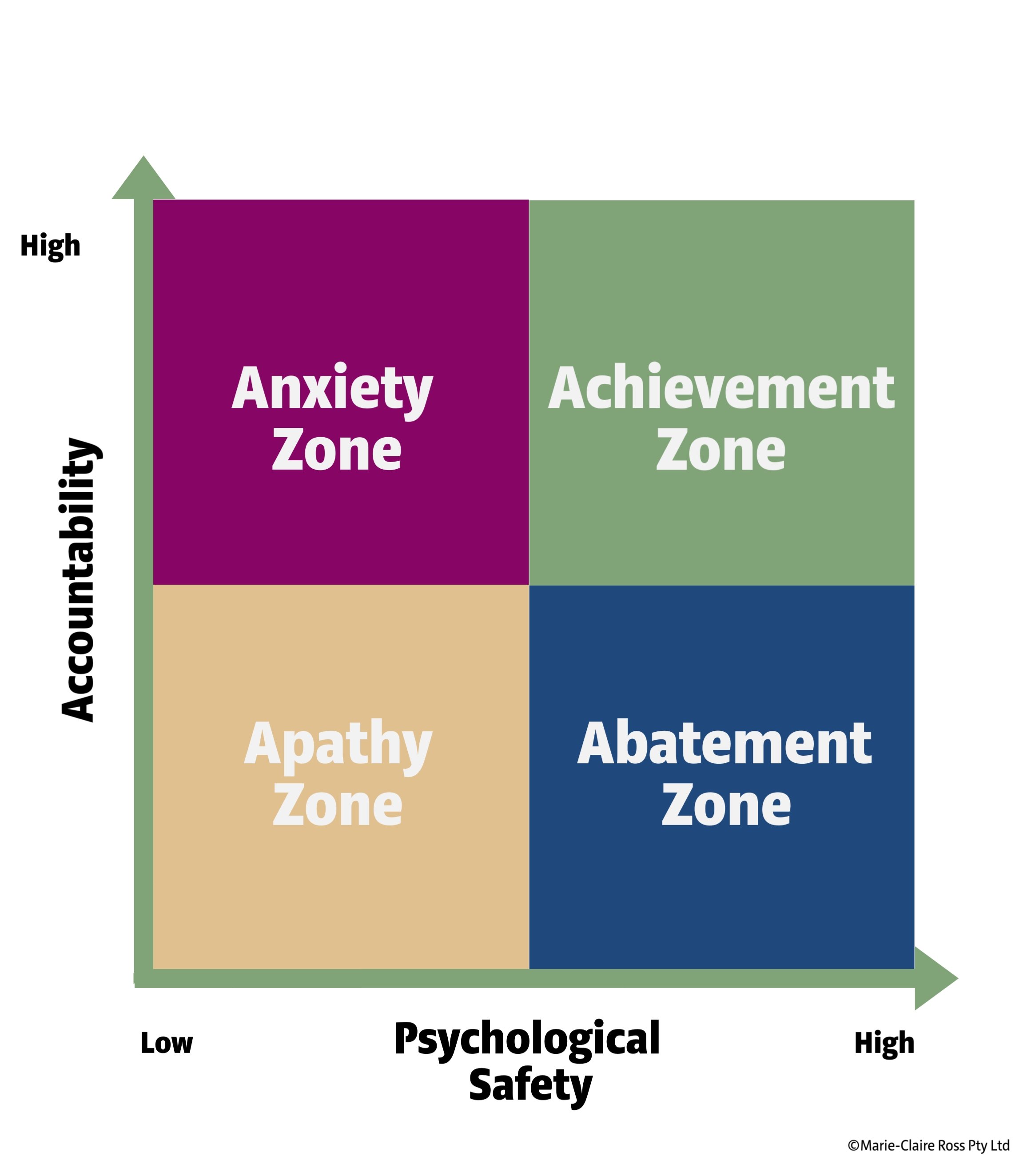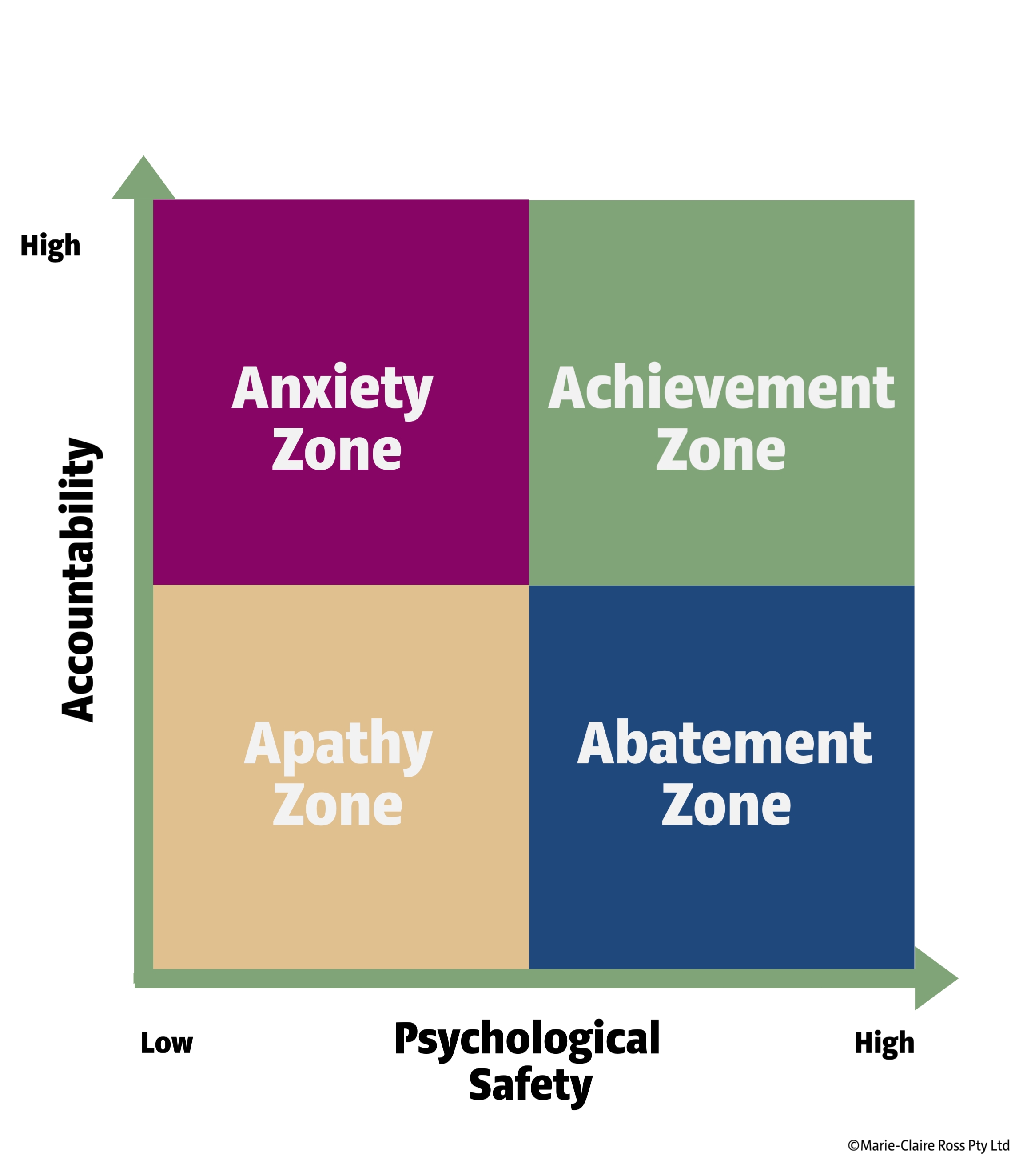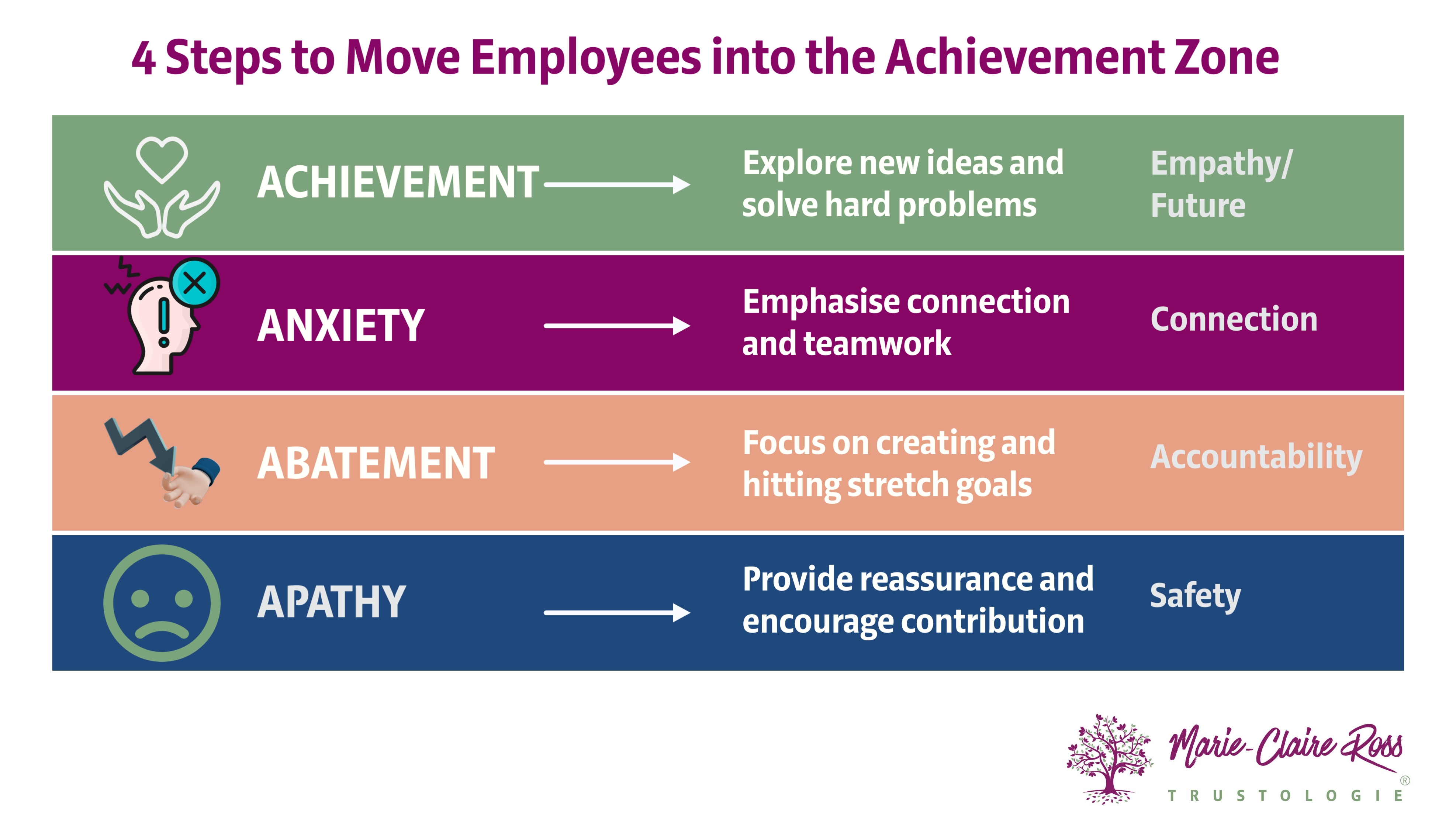11 min read
4 Practical Strategies for Better Emotional Management in the Workplace
I have a friend who often finds herself at the mercy of her emotions. Recently, she called me to rehash a confrontation she’d had with a group of...
Develop leaders, strengthen executive teams and gain deep insights with assessments designed to accelerate trust and performance.

Transform how your leaders think and perform with keynotes that spark connection, trust and high-performance cultures.

Explore practical tools, thought-leadership and resources to help you build trusted, high-performing teams.

Trustologie® is a leadership development consultancy founded by Marie-Claire Ross, specialising in helping executives and managers build high-trust, high-performing teams.

7 min read
Marie-Claire Ross : Updated on May 10, 2023

One of the models I unpack in my book, Trusted to Thrive, (you can download a free chapter here) highlights four different team zones based on the intersections between psychological safety and accountability.

It can often be a challenge for leaders to balance cultivating a friendly, warm team environment, with holding employees accountable in getting work done to the right standard.
Yet, it can be a game-changer when improving your leadership because leaders often confuse safety as creating a culture of anything goes. It's anything but. The reality is that creating safety is more about people knowing they are obligated to speak up about issues and having uncomfortable conversations, in order to improve performance.
But what is important to understand about this model is that it not only represents your team's current state of performance, but where you are as well.
These four team zones are like the ebb and flow of the ocean waves. We get pushed and pulled into different zones depending on our mindset, challenges and issues outside of our control.
In my Trusted Teams workshop, I have worked with hundreds of leaders to unpack which zone they are currently sitting in and how it impacts their team performance. This process works towards providing leadership clarity which is important to improving our results.
Given that we appear to be in the midst of a cultural revolution in how, when and why work gets done things are changing. Rapidly.
In my workshops and coaching sessions, I am finding that leaders are dropping down into lower levels of performance, in terms of their mindset.
So let me take you through some of the underlying themes that I am finding leaders are grappling with now, to help you work out where you might be (and what you can do about it).
Leaders in the apathy zone feel that safety is low and tend to be low in accountability.
Usually it's because they have reached a stage where they are fed up.
Typically, they are butting up against long-standing structural problems with their job. Any sort of effort they make to change issues is either ignored or deflected by management. They feel it's not safe to mention issues, so they complain a lot and cause havoc, in the misguided belief that no-one is listening to them. The irony is they create a lack of safety with their blaming and negative disposition.
There are lots of reasons why they end up in this spot. It could be they feel they are lumbered with low performers who they are unable to motivate or improve. Unclear performance management strategies or poor quality training in the organisation means they feel they are struggling alone with the burden of poor performers. While other times, they are overwhelmed with too many responsibilities and managing a job that is actually multiple jobs. Other times, they might also belong to a demographic that has less positive experiences in the workplace. So they have a tendency to feel unheard and ignored.
Of course, sometimes people are in apathy because they have had enough and are too afraid to admit they need to leave.
Questions to consider:
Keep in mind that apathy can also be a symptom of other underlying issues such as depression or anxiety, so if you find you are answering affirmatively to these questions it might be helpful to seek a therapist, speak to your boss about getting support or look for another job if the issues are endemic within your organisation.
Teams that are trapped in the abatement zone typically have experienced a period of success and then coasted on their previous glories. Jim Collins in his book, How the Mighty Fall, termed this “hubris born of success.” It is a common problem in organisations for teams to believe their success is due to their own superior qualities (“We have earnt our success because we’re so smart”). The result is inertia and a significant downside where teams can wake up to painfully discover they need to play catch up fast.
Abatement is when leaders create psychological safety, but don’t hold their employees accountable for excellence. In this environment, employees have no incentive to stretch themselves, be proactive or creative. Performing is declining.
If you're in the abatement zone, it might be because your boss isn't holding you accountable - your team doesn't hit its numbers and it doesn't get questioned. You might also be in this zone if you're exhausted from a past success, going through a personal issue or you're bored. It's easier to go through the motions and keep life simple.
If you suspect you are in a comfort zone, consider asking yourself:
Being stuck in a comfort zone can be a symptom of fear, anxiety, or uncertainty. It might also be that you lack direction or don't have any goals that inspire you. It's important to have a safe and supportive space to discuss your challenges and aspirations. Talk to your boss, coach, best friend, mentor or a therapist who can encourage you to take steps towards personal growth and development.
Teams in this performance are great at delivery and getting things done on time. But it's at a personal cost.
Anxiety zone teams are always about performance and not people. So people feel unsafe to make a mistake or miss a deadline.
Leaders can be in this zone because they put enormous pressure on themselves. If you're a perfectionist and always wanting to do the right thing by people, you might find that you regularly operate in this zone. Sometimes leaders are also in this zone because of the enormous workload their team needs to deal with or they have difficult clients. Unrealistic expectations and regular doses of microstress (small moments of stress that cumulatively have a big impact), puts the team into anxiety.
It could also be because you over-identify with your work. As Mandy Lehto says, It's when you base your value on your output and status traps you in a cycle of needing to prove you worth through promotions, pay rises and shiny accolades.
While in The Perfectionist’s Guide to Losing Control psychotherapist Katherine Morgan Schafler explains how overachievers appear to be pursuing a worthy goal but in fact they’re pursuing an ideal—a hall of mirrors that is ever-shifting and never achievable.
The pursuit of success can be addictive - and endless.
Not only that, if we tend to be driven to increase safety in our world, then anxiety might be how we operate to keep our fears at bay. Feeling unsafe often means we over-compensate by working too hard, so that we do not disappoint others.
Operating in the anxiety zone for too long often leads to stress and burnout.
According to the World Health Organization (WHO), burned-out workers are often struggling on three fronts: “feelings of energy depletion or exhaustion; increased mental distance from one’s job, or feelings of negativism or cynicism related to one’s job; and reduced professional efficacy.” If you don't get the chance to rest and recuperate, you will head into the abatement and apathy zones - feeling tired, checked out, and unproductive.
Questions to ask yourself include:
It takes self-awareness and knowing your limits - when to keep pushing and when to take it easy. And to create a safe environment where people are challenged to be their best, are excited about the future and work together to solve problems.
A lot of leaders like to tell me they are in the Achievement Zone, but you don't get there accidentally. It takes dedicated work and self-reflection. In my research, I find leaders who stay here the most reflect each week on how they are getting results, not just what results they are getting. They also work on being in a positive state of mind through regular exercise, meditation and even journalling. Getting enough rest, eating well and spending time with friends and family are a priority to keeping them performing well.
Questions to reflect on are:
The good news is that we are not stuck in these zones forever.
Taking the time to self-reflect and asking yourself these questions helps you to work out where you are, so you can take the right steps to get to where you want to be.
“When we can no longer change a situation, we are challenged to change ourselves.” -Victor Frankel
If you find that you are in a zone that disappoints you, just know that this is not who you are. With the right support, feedback and will to change, you can move into a better functioning place. Be kind to yourself.
After all, we all deserve to love our jobs and the people we work with. And sometimes, the behaviours of others, what we put up with and how we react, put us in a place where we need to have the courage to leave. If we are no longer growing and enjoying our role, it's time to seek greener pastures.
Use these questions to inspire you to lead yourself and your team to a higher performing and more enjoyable work environment.

11 min read
I have a friend who often finds herself at the mercy of her emotions. Recently, she called me to rehash a confrontation she’d had with a group of...

9 min read
True leadership presence isn’t a performance or a set of charisma hacks; it is the felt experience of who you are being in the room. By cultivating...

13 min read
As teams return from their summer (or winter) break, you may notice subtle shifts in your team’s energy. Even if the end of year was positive, a new...

Around the world, there’s growing discontent about the ineffectiveness of employee engagement surveys. Over the last fifteen years, employee...

When we were all young children, we all used to bug our parents with lots of "Why?" questions. And while this can test even the calmest of parents,...

Are your safety efforts are stuck in the past? Unfortunately, some companies think of safety as an afterthought ensuring that it is never fully...